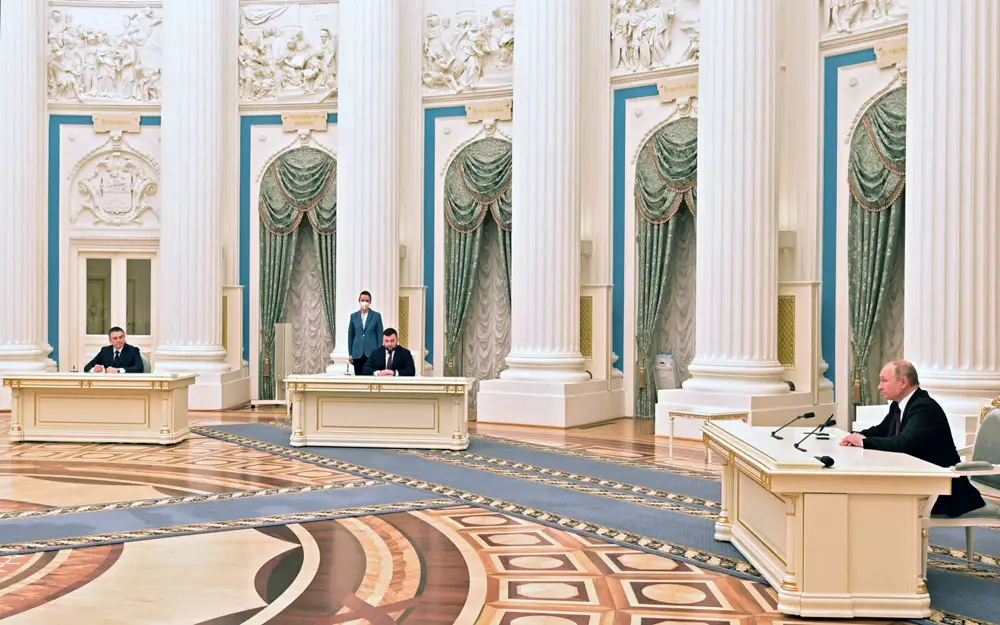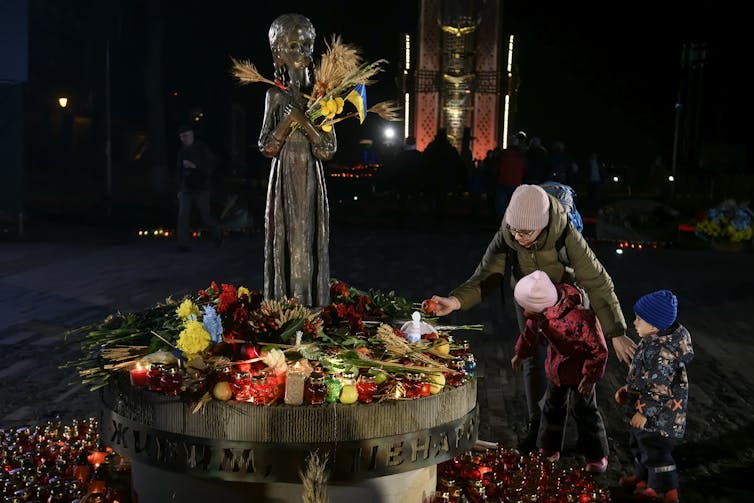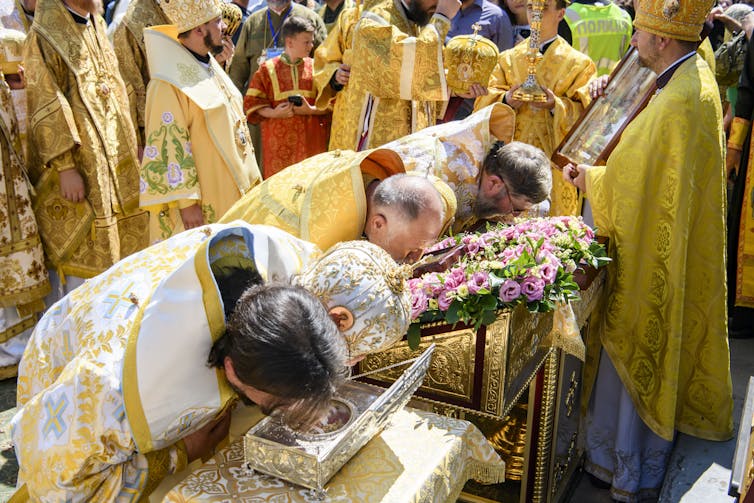
(Alexei Nikolsky/Russian Presidential Press and Information Office/TASS via Getty Images)
By Naomi Schalit
Russian President Vladimir Putin, in a provocative address that could be construed as a pretext to war, claimed on Feb. 21, 2022, that all of Ukraine belongs to Russia and formally recognized the independence of two breakaway regions in Ukraine that are controlled by Moscow-backed separatists. His government then ordered troops to those regions.
The U.S. and European countries were quick to respond, with the Biden Administration announcing that it “will prohibit new investment, trade, and financing by U.S. persons to, from, or in” the two regions, known since 2014 as the Donetsk People’s Republic and Luhansk People’s Republic. The European Union’s executive branch leader, Ursula von der Leyen, condemned Putin’s action as a “blatant violation of international law.” And NATO chief Jens Stoltenberg said, “I condemn Russia’s decision to extend recognition to the self-proclaimed ‘Donetsk People’s Republic’ and ‘Luhansk People’s Republic.’”
To help readers understand the background of these developments, here are five stories The Conversation has published about the centuries-long bad blood between Ukraine and Russia, manifested in everything from religion to political ideology.
1. Why Putin struggles to accept Ukrainian sovereignty
Putin’s announcement that Russia would recognize the independence of the two Ukrainian territories is a reflection of his view that Ukraine is part of Russia’s once-great empire, which at one time ranged from current-day Poland to the Russian Far East.
The Russian president is not alone in that view. Two scholars, Jacob Lassin of Arizona State University and Emily Channell-Justice of Harvard University, write that “for centuries, within the Russian Empire, Ukraine was known as ‘Malorossiya’ or ‘Little Russia.’ The use of this term strengthened the idea that Ukraine was a junior member of the empire.”
Czarist policies from the 18th century forward, write Lassin and Channel-Justice, “suppressed the use of the Ukrainian language and culture. The intention of these policies was to establish a dominant Russia and later strip Ukraine of an identity as an independent, sovereign nation.”
2. The Soviet era added to resentment toward Russia
Lassin and Channel-Justice also write about how the shared history of Ukraine and Russia has bred ill will among Ukrainians towards Russia.
Among the many historical grievances: The Soviet Union’s collectivist plans helped wreck the once-famed Ukrainian agricultural sector, leading to a widespread famine in 1932 and 1933, known as the Holodomor.
“Research estimates that some 3 million to 4 million Ukrainians died of the famine, around 13% of the population, though the true figure is impossible to establish because of Soviet efforts to hide the famine and its toll,” write Lassin and Channel-Justice. Soviet leader Josef Stalin prevented Ukrainian farmers from traveling in search of food, and severely punished anyone who took produce from collective farms, which made the famine much worse for Ukrainians. “As such, some scholars call the famine a genocide,” they write.

Photo by Maxym Marusenko/NurPhoto via Getty Images)
3. Putin’s strategic pipelines
After Putin’s announcement, the Biden Administration said it would impose economic sanctions on those doing business in the eastern Ukraine provinces declared independent by Russia. Biden has also declared that “severe economic consequences” would follow a Russian invasion of Ukraine.
But it may be hard to get allied countries in Europe to go along with such sanctions, writes Ryan Haddad of the University of Maryland. The reason: the dependence of many European countries on Russian energy.
Russia has a long history of using energy to divide the U.S. and Europe, and Haddad writes that “Russian [natural] gas exports to Europe reached a record level in 2021. … Europe got a glimpse of the potential consequences of this dependence in December 2021, when Russia reduced its gas exports to Europe as the crisis involving Ukraine was heating up.”
4. Russia has been at war with Ukraine for years – in cyberspace
As the world awaits the possible start of war between Russia and Ukraine, scholar Maggie Smith at the United States Military Academy at West Point says that Russia has been attacking Ukrainian government operations and infrastructure for years via cyberspace.
“Russia has interfered in Ukrainian elections, targeted its power grid, defaced its government websites and spread disinformation,” writes Smith. “Strategically, Russian cyber operations are designed to undermine the Ukrainian government and private sector organizations. Tactically, the operations aim to influence, scare and subdue the population.”
All of those actions, writes Smith, “destabilize Ukraine’s political environment.”

Photo by Maxym Marusenko/NurPhoto via Getty Images
5. The conflict is also religious
To understand the present, it helps to understand the past. The tensions between Russia and Ukraine are not just political in nature. They’re also religious, writes Arizona State University scholar J. Eugene Clay.
“Two different Orthodox churches claim to be the one true Ukrainian Orthodox Church for the Ukrainian people,” writes Clay. “The two churches offer strikingly different visions of the relationship between the Ukrainian and the Russian peoples.”
The Ukrainian Orthodox Church – Moscow Patriarchate stresses “the powerful bonds that link the peoples of Ukraine and Russia.” The Orthodox Church of Ukraine, on the other hand, was formally recognized in January 2019 and is “the culmination of decades of efforts by Ukrainian believers who wanted their own national church, free from any foreign religious authority.”
The two churches, writes Clay, reflect a fundamental question: Are Ukrainians and Russians one people or two separate nations?
![]()
Naomi Schalit is Senior Editor for Politics and Society at The Conversation US. Emily Channell-Justice is Director of the Temerty Contemporary Ukraine Program, Harvard University. J. Eugene Clay is Associate Professor of Religious Studies, School of Historical, Philosophical and Religious Studies, Arizona State University. Jacob Lassin is Postdoctoral Research Scholar in Russian and East European Studies, Arizona State University. Maggie Smith is Assistant Professor of Public Policy, United States Military Academy West Point. Ryan Haddad is Research Affiliate at the Ed Snider Center for Enterprise and Markets, University of Maryland.




























Dennis says
Russia will do as Russia wants. China will do what China wants. No one can or will do anything about it. Europe has to deal with its own problems. America is too broken, and can’t even deal with its own problems.
Jimbo99 says
Exactly, we all know the 800 lb gorilla in the room is the B-word. B needs a villain to distract from Covid & inflation. O-word & B-word will be forever linked to Ukraine. Just like the Bush (HW & W) clan to Saddam Hussein & Iraq. All this goes back to the Hunter B-word scandal & anything the Democrats crafted along the way. Funny with T-word it was “Russia, Russia, Russia”, only the scandals & crisis involves the usual suspects of swamp Democrats.
https://www.washingtonpost.com/politics/2022/01/24/ukraine-us-politics/
joe says
I don’t know who Madrid Mike is, but he nailed it with this tweet –
“A lot of Americans who think that freedom fighting is about not wearing a mask to Costco are about to learn something from the brave people of Ukraine.”
JimBob says
Calls to mind a Dylan lyric:
And like Pharaoh’s tribe
They’ll be drownded in the tide
Ben Hogarth says
Vladimir Putin forecasts everything he is going to do, sometimes years in advance – if you listen carefully. The intelligence community among the allied nations have been in lock-step with his every move this time, avoiding the failures of 2014 and the (illegal) annexation of Crimea. We have no doubt that Putin’s larger aims are to invade the entirety of Ukraine and to eliminate the political leadership there, replacing it with a pro-Russian puppet state. His signalling could not be more apparent as his speech yesterday declaring that Ukraine does not have a right to exist as a sovereign nation and that it essentially stole natural resources and rich lands from Russia in its breakaway in 1991. Putin further implied Ukraine is a “puppet state” of the West – an attempt to rally Russian citizens to his war cry. We will most likely see greater military action by Russia in the coming days and a long, protracted conflict in the region. In all probability, Putin will send Russian forces into the Ukraine-occupied section of the “separatist region” in an attempt to engage in conflict with Ukrainian regular and irregular troops there. He will then use that Russian-induced conflict as an excuse to fully escalate to all out war.
I very much doubt there is any amount of diplomacy that will stop Putin this time. There is nothing more dangerous on earth than a dictator with time running out.